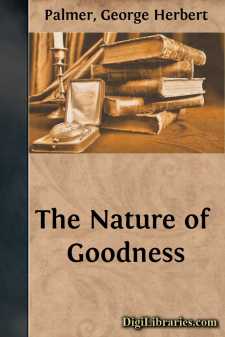Categories
- Antiques & Collectibles 13
- Architecture 36
- Art 48
- Bibles 22
- Biography & Autobiography 813
- Body, Mind & Spirit 142
- Business & Economics 28
- Children's Books 15
- Children's Fiction 12
- Computers 4
- Cooking 94
- Crafts & Hobbies 4
- Drama 346
- Education 46
- Family & Relationships 57
- Fiction 11828
- Games 19
- Gardening 17
- Health & Fitness 34
- History 1377
- House & Home 1
- Humor 147
- Juvenile Fiction 1873
- Juvenile Nonfiction 202
- Language Arts & Disciplines 88
- Law 16
- Literary Collections 686
- Literary Criticism 179
- Mathematics 13
- Medical 41
- Music 40
- Nature 179
- Non-Classifiable 1768
- Performing Arts 7
- Periodicals 1453
- Philosophy 64
- Photography 2
- Poetry 896
- Political Science 203
- Psychology 42
- Reference 154
- Religion 513
- Science 126
- Self-Help 84
- Social Science 81
- Sports & Recreation 34
- Study Aids 3
- Technology & Engineering 59
- Transportation 23
- Travel 463
- True Crime 29
The Nature of Goodness
Categories:
Description:
Excerpt
THE DOUBLE ASPECT OF GOODNESS
In undertaking the following discussion I foresee two grave difficulties. My reader may well feel that goodness is already the most familiar of all the thoughts we employ, and yet he may at the same time suspect that there is something about it perplexingly abstruse and remote. Familiar it certainly is. It attends all our wishes, acts, and projects as nothing else does, so that no estimate of its influence can be excessive. When we take a walk, read a book, make a dress, hire a servant, visit a friend, attend a concert, choose a wife, cast a vote, enter into business, we always do it in the hope of attaining something good. The clue of goodness is accordingly a veritable guide of life. On it depend actions far more minute than those just mentioned. We never raise a hand, for example, unless with a view to improve in some respect our condition. Motionless we should remain forever, did we not believe that by placing the hand elsewhere we might obtain something which we do not now possess. Consequently we employ the word or some synonym of it during pretty much every waking hour of our lives. Wishing some test of this frequency I turned to Shakespeare, and found that he uses the word "good" fifteen hundred times, and it's derivatives "goodness," "better," and "best," about as many more. He could not make men and women talk right without incessant reference to this directive conception.
But while thus familiar and influential when mixed with action, and just because of that very fact, the notion of goodness is bewilderingly abstruse and remote. People in general do not observe this curious circumstance. Since they are so frequently encountering goodness, both laymen and scholars are apt to assume that it is altogether clear and requires no explanation. But the very reverse is the truth. Familiarity obscures. It breeds instincts and not understanding. So inwoven has goodness become with the very web of life that it is hard to disentangle. We cannot easily detach it from encompassing circumstance, look at it nakedly, and say what in itself it really is. Never appearing in practical affairs except as an element, and always intimately associated with something else, we are puzzled how to break up that intimacy and give to goodness independent meaning. It is as if oxygen were never found alone, but only in connection with hydrogen, carbon, or some other of the eighty elements which compose our globe. We might feel its wide influence, but we should have difficulty in describing what the thing itself was. Just so if any chance dozen persons should be called on to say what they mean by goodness, probably not one could offer a definition which he would be willing to hold to for fifteen minutes.
It is true, this strange state of things is not peculiar to goodness. Other familiar conceptions show a similar tendency, and just about in proportion, too, to their importance. Those which count for most in our lives are least easy to understand. What, for example, do we mean by love?...


